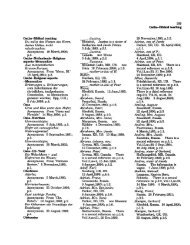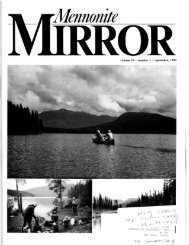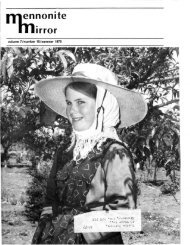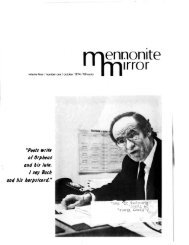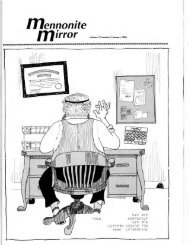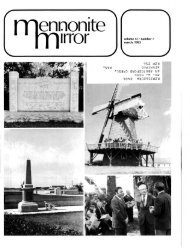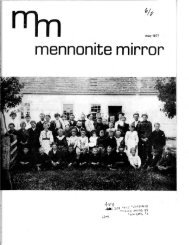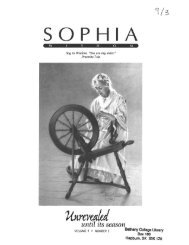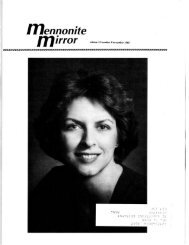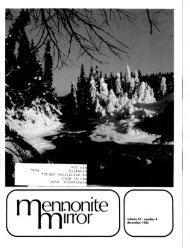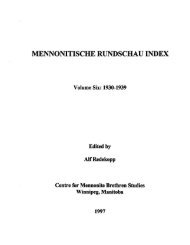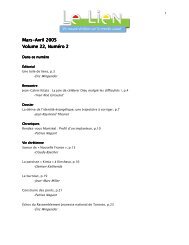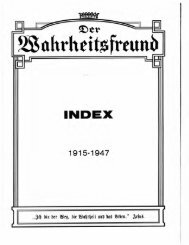• Donwood West opens new retirement option • - Canadian ...
• Donwood West opens new retirement option • - Canadian ...
• Donwood West opens new retirement option • - Canadian ...
You also want an ePaper? Increase the reach of your titles
YUMPU automatically turns print PDFs into web optimized ePapers that Google loves.
in agriculture. However, many of those<br />
who did want to farm found that good<br />
land was not availa ble . Many had difficult<br />
experie nces. Several spoke of crop<br />
failures which greeted their efforts. Others<br />
had never been farmers in the first<br />
place. One father had been an accountant,<br />
and had felt completely out of place<br />
in the .rural environment. The appeal of<br />
being able to keep chicke ns and gardens<br />
appealed to many early residents of this<br />
community. It was a way of providing<br />
some basic necessities at a time when<br />
money was difficult to obtain. It also<br />
somehow provided a connection with<br />
their traditional way of life .<br />
In the early days of the community,<br />
residents did find both economic opportunity<br />
a nd a close community which<br />
many still remember very clearly. One<br />
woman described how as children they<br />
would go and play in the cow pastures<br />
after weddings with the bride and groom.<br />
They did not need to send out invitations<br />
for the weddings. A few would be printed<br />
and these would be passed around the<br />
neighborhood. Many had happy memories<br />
of the picnics which would be held<br />
after church, when all would share food<br />
and play games out in the pastures. The<br />
church was a focal point for most during<br />
these early years, and a center of activity,<br />
whe n Ge neral Conferences members and<br />
Me nnonite Brethren worshipped together,<br />
before both established their own<br />
separate churches. As one woman put it:<br />
"Everything or anything that happened<br />
to you involved the church."<br />
One story told by an early resident<br />
seems to bring together many of these<br />
themes. He was already a resident of<br />
North Kildonan as the story begins. He<br />
had been unable to find a job, and so was<br />
chopping firewood and earning $1 a<br />
week. One winter day, he met a man in a<br />
de partment store in downtown Winnipeg<br />
who offered him a job on his farm somewhere<br />
near the city. For lack of available<br />
alte rnatives, he accepted. However, the<br />
young man was one of those without any<br />
farming experience at the time, which<br />
resulted in a series of misadventures. One<br />
of his first tasks was to pluck chickens. Not<br />
having done this before, he ended up<br />
pulling the chickens apart limb from limb.<br />
He was also asked to milk the cow, which<br />
he did the first two days, but by the third<br />
day, the cow stopped giving milk for him.<br />
Another task was to hook up the dog to<br />
the sleigh and take the farmer's young<br />
child for a ride. However, the dog would<br />
not get off the sleigh, and so he ended up<br />
pulling both child and dog. In the meantime,<br />
it was Christmas, but all he received<br />
in honour ofthe occasion was the leftover<br />
a/mennonite mirror/april1988<br />
chicken bones that the farmer's children<br />
had already eaten on. After five days of<br />
this the young man had enough, and said:<br />
"I quit. Please pay me ." The farmer<br />
refused, called him a communist, and<br />
threatened to phone the police. However,<br />
he was able to ask the farmer's young<br />
daughter for directions, and she directed<br />
him toward a main road which he recognized.<br />
After a long day's walk through<br />
bitterly cold weather he finally arrived<br />
back home in North Kildonan, where he<br />
received a good homemade meal of<br />
"kielke" and "plume mouse."<br />
Some of the early residents recalled<br />
vivid first impressions of this <strong>new</strong> settlement<br />
itself. One of the strongest memories<br />
for many was of the mud. One woman<br />
recalled how when it rained they would<br />
take their shoes and socks off and wade<br />
through the muck in the ditches. Another<br />
remembered an occasion when a baby<br />
was born, and the doctor who was called<br />
got stuck in the mud. The father had to get<br />
out his horses and pull him out. A third<br />
recalls when "everything was mud, mud,<br />
mud." First one foot and then the other<br />
would become stuck in the mud on the<br />
way to the streetcar stop, when they<br />
wanted to go downtown. When they<br />
finally got to the stop, their overshoes<br />
would be left on the bank to keep the mud<br />
out of the streetcar. The overshoes would<br />
A MENNONITE TRAGEDY<br />
still be there waiting for them whe n they<br />
got back.<br />
These recollections and anecdotes<br />
combine with the results of the more systematic<br />
network analysis to give a picture<br />
of a very different way of life. While further<br />
analysis is required, the answe rs to<br />
the various questions generally show an<br />
extent of closeness within the community<br />
which appears to have since been lost to a<br />
large extent, though perhaps not entirely.<br />
In any case, this unique experiment in<br />
urban' communal living is a fascinating<br />
aspect of our heritage as Mennonites in<br />
the city. mm<br />
Three young girls with mothers<br />
and chicken coop in the background.<br />
A Pre-Modern Prose Poem, Without Rhyme or Reason<br />
He tried to be a good Mennonite,<br />
A person of discipline and good sense,<br />
Living simply and shrewdly within one's means.<br />
The delicate balance between simplicity and enjoyment<br />
was accomplished by a strategy of half measures.<br />
A cup of coffee, followed by just another half.<br />
A piece of pie, with another half.<br />
A giant serving of werenechi,<br />
with only another half.<br />
Living shrewdly was a matter of the eyes<br />
attuned to specials,<br />
a soul learning patience,<br />
till prices were marked down in Steinbach fashion.<br />
Never going anywhere without the necessary coupons.<br />
When he died his family, honoring his memory,<br />
built half a tombstone,<br />
with tributes written simply and sparingly<br />
in half-sentences.<br />
But, after checking out the prices,<br />
they decided against a funeral.<br />
Because, try as they might,<br />
they found no coupons.<br />
- Roy Vogt, inspired by occasional snide<br />
comments from a bemused wife.



